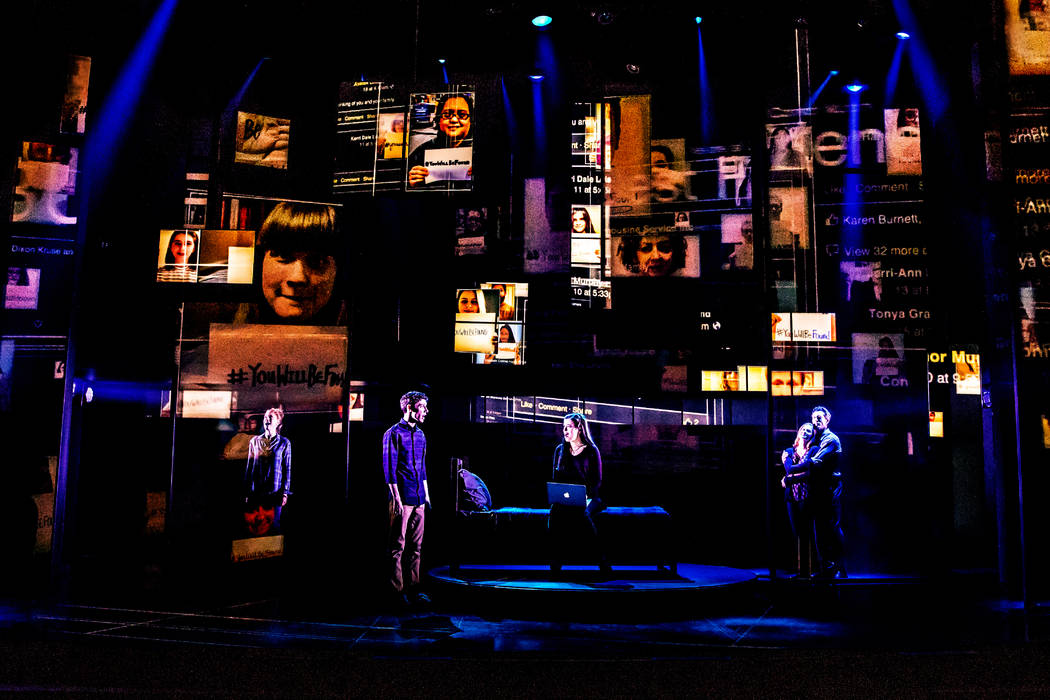‘Dear Evan Hansen’ coming to Las Vegas this month

He’s not the type of person any of us strives to be.
Yet he’s the type of person we all are, to some extent.
Most everyone can relate to the titular character in the equally moving and lacerating Broadway musical “Dear Evan Hansen.”
We’d just rather not.
He’s a fount of insecurities, a double helix of self-doubt and awkwardness. Think about attempting to sign your name with your nondominant hand. That’s what it’s like to be Evan Hansen in social situations.
A teenager suffering from anxiety, he’s an outsider’s outsider, someone who feels as invisible as the air he breathes.
He’s the incarnation of the eternal question: How can you be yourself when you don’t know who you are?
“Evan is not someone who we, as authors, are putting out there and saying, ‘Don’t you wish that you were this person?’ It’s not that kind of show. Evan is not a hero,” says Steven Levenson, who wrote the book for “Dear Evan Hansen,” winning a Tony Award for his efforts. “It’s somebody that people see themselves in, in spite of the flaws of the character, in spite of the damage of this character and the things that he does. People see, ‘Oh, that’s me, for better or worse.’ ”
The positives and negatives of social media
If Evan is a complex, multifaceted character, so is the musical built around him, which addresses suicide, alienation, the processing of grief and how one small mistruth can have outsize consequences, among other things, all within the crucible of the social media age.
The story centers around Evan, struggling to fit in during his senior year in high school, feigning a relationship with a classmate, Connor, who commits suicide. He forges emails between the two with the help of a friend, establishing a relationship with Connor’s family in the process, including his sister, Zoe, whom Evan has a crush on.
A speech that he gives about Connor goes viral, as do other things, which adds a timely spin on the narrative: this being the first generation of kids to come of age fully immersed in social media. Raising children in this era is akin to navigating a maze of parenthood with no bread crumbs of precedence to help guide the way.
“I think the thing that this show does so beautifully is that it shows the positives and negatives of social media and how thin that line is, how it’s so important the way that we walk that line,” says actor Ben Levi Ross, who’s playing Evan Hansen in the show’s touring production.
So while “Dear Evan Hansen” isn’t about social media, per se, it’s the incubator of so much emotion.
“When we first started talking about the show and the idea behind it, we knew that there was a really simplistic story to tell about social media, which is the obvious story, that it’s destructive and encourages people’s worst impulses and is a place where untruths proliferate and get bigger,” Levenson says. “But the thing that we were interested in was trying to figure out the ‘why?’ of it. Why were people so drawn to social media to the point that they will believe things that they should probably know better than to trust? What compels us to need to belong and to need to connect through this technology? It seems to be this hunger for connection, which has a very human side to it.”
Distilling this humanity with humor and wit, depth and poignancy has made “Hansen” a hit since its 2015 debut in Washington, D.C. The musical moved to Broadway the following year and hit the road last fall.
Have Tonys, will travel
Set to a buoyant pop-rock soundtrack, which won a 2018 Grammy for best musical theater album, “Dear Evan Hansen” was nominated for nine Tony Awards in 2017 and won six of them, including best musical.
The key to the show’s success has been its relatability.
“I think we all in some ways feel a little bit like misfits,” says Ross, who turns 21 the day “Hansen” debuts in Vegas. “We’re always trying to be seen, we’re always trying to be heard, that’s just human nature. So for me, it was about finding where that was inside me.
“The place where it related the most was growing up and figuring out who I was in my sexual identity,” he continues. “A lot of kids, when they’re growing and they’re questioning their sexual or gender identity, you’re feeling the most like an outsider. There’s nothing to grab on to, there’s nothing to solidify who you are as a human being until you come to terms with yourself. Going back into that place for me really was a special and important entry point (to portraying Hansen).”
Levenson says he was unprepared for how powerful the reaction to “Hansen” would be, which he started noticing in earnest when fans began reaching out to the show’s website.
“There was no real forum or way to get in touch with anyone. It was just sort of an informational website,” he recalls. “And people started writing these incredibly eloquent, incredibly moving accounts of things that had happened to them, their own stories with grief, with depression, with mental illness. Our producer, who was getting these emails, started sharing them with us and saying, ‘This is the tip of the iceberg. We’re getting a lot of these.’ That was really kind of shocking and breathtaking, that people were responding on that level.”
If people see themselves in these characters, social media is the looking glass.
This new era doesn’t shield us from old hurts, though.
“Dear Evan Hansen” isn’t meant to assuage these feelings so much as convey to audiences that they’re not alone in feeling them.
“When I was a teenager, you sort of suspected that you weren’t invited to the party. But now you know in real time that you weren’t invited to the party,” Levenson chuckles of social media’s ego-bruising potential. “We all curate our lives online, and I think for young people, they don’t always know that that’s true. They think they’re the only ones who are pretending to lead a perfect life and everyone else must actually be as happy as they seem online.
“There is something eye-opening for some audience members,” he adds, “that people do feel the kind of pain that they might feel.”
Contact Jason Bracelin at jbracelin@reviewjournal.com or 702-383-0476. Follow @JasonBracelin on Twitter.
Preview
What: “Dear Evan Hansen”
Where: The Smith Center, 361 Symphony Park Ave
When: 7:30 p.m. Tuesday-Jan. 20
Tickets: $50 and up (702-749-2000)



















